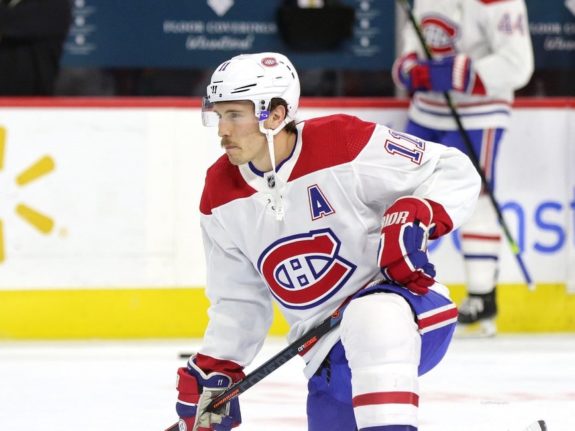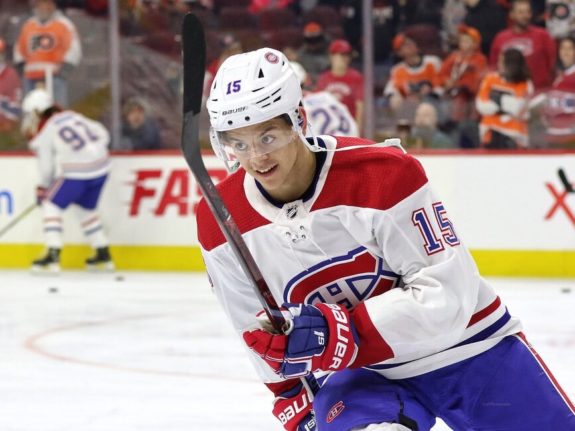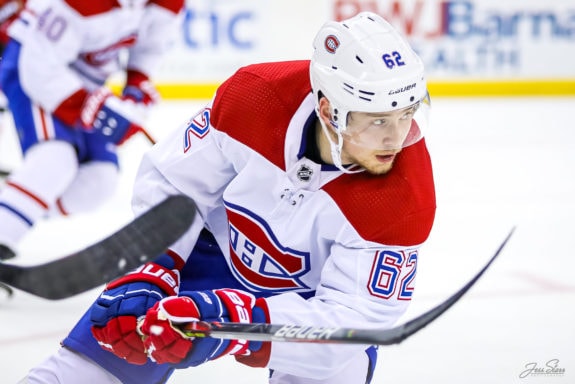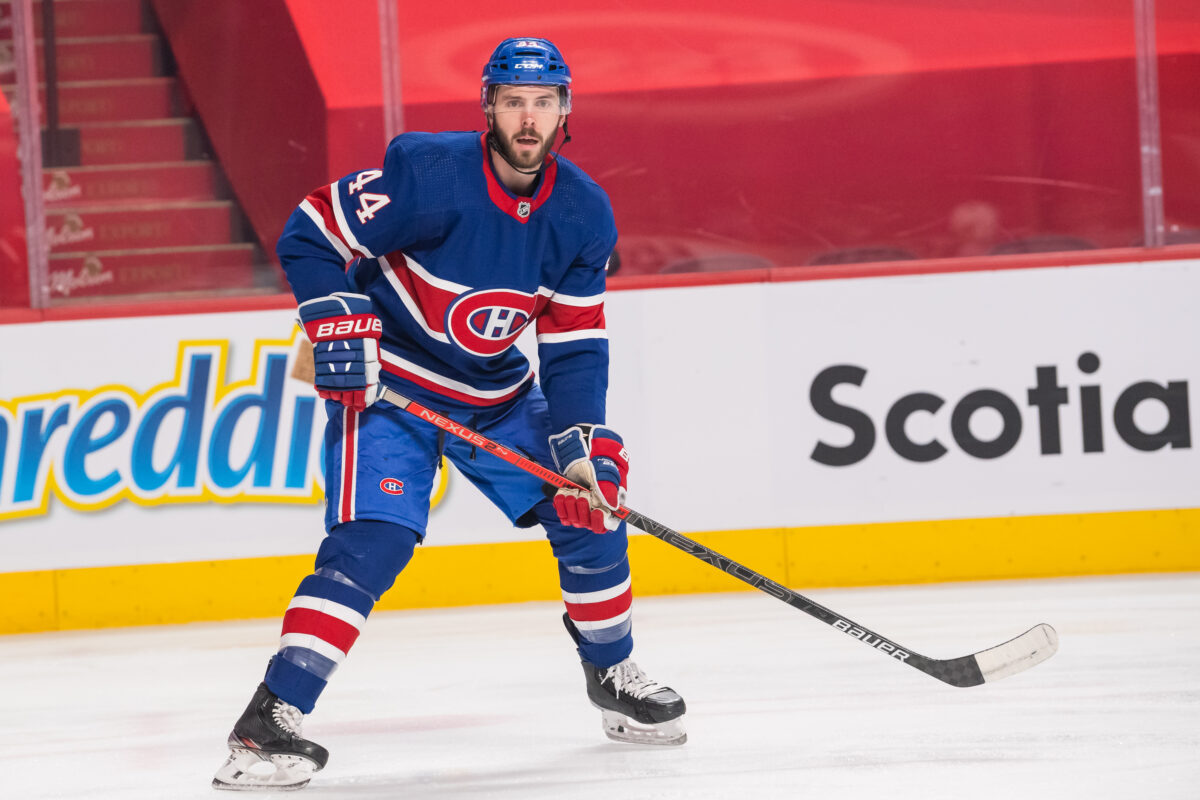Though the majority of the Montreal Canadiens’ protection list was somewhat expected, there were certainly a fair number of surprises. One of the biggest takeaways from the protection list is that we now have a clearer picture of what general manager Marc Bergevin believes are the key components to a bright future in Montreal.
It would be dishonest to suggest that I agree with keeping every player on the list, but there is a silver lining to virtually every decision made by the organization’s upper brass. With that being said, I want to take a few moments to do a rundown of every protected player, addressing the ups and downs of each one.
So, without further ado:
Josh Anderson (Forward)
Josh Anderson came under a lot of scrutiny throughout the 2021 Playoffs for appearing invisible on the ice, and it was at the moment when someone suggested this that he scored an important goal that turned the tide of the game. There is a lot to love about the 27-year-old, but there are certainly areas of concern, too. Bergevin clearly sees something worthwhile in keeping him around, seeing as how he was signed to a seven-year contract worth $38.5 million.
But we’ll get to this in a moment.
Pros:
- Anderson is a big guy. At 6-foot-3 and weighing 226 pounds, he has the potential to be an absolute force on the ice. There were a number of times this past season that he clearly demonstrated his willingness to throw his body around on the ice. His aggressive type of play has even spooked opposing players off the puck. This kind of player beautifully supports the style of non-aggressive players on the team, such as Cole Caufield and Nick Suzuki.
- Anderson has the clutch factor. He potted five goals over the course of 22 games in the 2021 Playoffs, but that’s not the impressive part. It’s that he manages to make a difference when it matters most. One of the best moments was his two-goal game against the Vegas Golden Knights in the conference final.
- He is also one of the most emotional players on the Canadiens’ roster. I understand that some would not consider this to be a strict upside, but I think it is in this case. Emotional players have a way of turning the momentum in their team’s favor. He is a breath of fresh air from Max Domi — a player who could not seem to get his emotions under control, often leading to undisciplined, bone-headed plays.
Cons:
- The major concern about Anderson is the hefty contract. Bergevin extending a seven-year deal to a player who had only played 26 games the season before he was acquired is a bit of a head-scratcher. During the 2018-19 season with the Columbus Blue Jackets, Anderson played the full 82-game season and registered 47 points over the course of that campaign. If he can manage to get back to this kind of production, I wouldn’t be too bothered by the contract. But the simple fact is that he is not getting any younger, and his 2020-21 regular-season performance was lackluster, to say the least. He scored 17 goals and put up just seven assists for 24 points in 52 games. These aren’t the worst numbers in the world, but they are not enough to warrant a seven-year contract.
Joel Armia (Forward)
Bergevin electing to protect Joel Armia came as a surprise to me. I initially thought he would be left exposed as an unrestricted free agent (UFA), allowing the club to protect someone else in the hopes of re-signing Armia after the expansion draft (same goes for Phillip Danault). It obviously did not pan out this way. Ultimately, I’m happy to see that Bergevin believes Armia can add something to the team for the 2021-22 season.

Pros:
- Aside from Danault, Armia is probably the Canadiens’ best penalty-killing forward. This was made very apparent during Game 1 of the Stanley Cup Final, where Armia was not able to play due to COVID-19 protocol. (From “Montreal penalty kill misses Joel Armia in Game 1 final loss,” The Associated Press, 6/29/2021) That particular game was probably among the best arguments for keeping him. The missing link was clear.
- Like Anderson, Armia adds a big body to the fourth line — one of the most productive lines for Montreal during the postseason. It has yet to be seen if Corey Perry will rejoin Armia this upcoming year, but I certainly hope so.
- He is a disciplined player. Yes, he only potted seven goals and seven assists for 14 points over the course of 41 games during the 2020-21 season, but he also had a plus-minus of plus-10, and he took only 10 minutes worth of penalties. A player with a big body who knows how to stay out of the box is someone I want on my team.
Cons:
- The major downside to Armia’s play is his takeaway/giveaway numbers. During the 2020-21 season, he raked in 18 takeaways and 18 giveaways. This is the first time in his career that these two numbers have been anywhere close to each other. Maybe this was due to a shortened season, but having a 50/50 shot of giving the puck up every time he has possession is something that should surely be addressed next season.
Jake Evans (Forward)
I like the move to protect Jake Evans. With a cap hit of $750,000, Bergevin made the right move in locking down one of the future players of the club. Evans isn’t going to be a 60-point player, but he always seems to be contributing in important ways. I am especially keen on his defensive game. Now that it appears the Canadiens will be losing Danault, it is important for Montreal’s forwards to step up in the defensive end.

Pros:
- As I mentioned above, one of the most intriguing parts of Evans’ game is his defensive play. He’s not afraid to get along the boards and battle it out with the opposition. He is aggressive, and he doesn’t back down. This cannot be said for a good chunk of the Canadiens’ forwards (I’m thinking Suzuki and Caufield, primarily).
- We still don’t know Evans’ ceiling. He had a great 2019-20 season with the Laval Rocket, with 14 goals and 24 assists for 38 points in 51 games. He hasn’t played a full season for the Canadiens yet, but I can certainly see Evans being a 30-point player.
Cons:
- I am concerned about Evans’ ability to stay healthy. There is a lot to be excited about when a young player shows a ton of promise, but he is a strange case. He has suffered a number of injuries — a few of which have been concussions. The last thing anyone wants is for him to turn into an Andrew Shaw situation, where their career is cut short due to head injuries. This also means that the league needs to start taking dangerous plays seriously, such as the Mark Scheifele hit on Evans in Game 1 of the second round of the playoffs.
Brendan Gallagher (Forward)
Not much more needs to be said about Brendan Gallagher. It’s no surprise that he was protected. As the 147th-overall pick in the 2010 NHL Entry Draft, he has turned into a franchise player. If Shea Weber doesn’t return to the Canadiens, Gallagher may become the club’s captain. I will not be disappointed if this turns out to be the case.

Pros:
He is the grittiest player on the team, no question. He has been through thick and thin with the club, and I don’t see that stopping any time soon. Having only played 35 games in the 2020-21 season due to an injury, he still managed to rake in 14 goals and nine assists for 23 total points.
Cons:
Despite Gallagher’s ability to generate offensive chances, he hasn’t exactly been on a line built to score a lot of goals. He spent the majority of his time during the regular season on a line with Danault and Tomas Tatar. Danault is notorious for lacking offensive abilities, making it difficult for the winger to get anything going. It has yet to be seen how he will perform with different linemates for the 2021-2022 season.
Jesperi Kotkaniemi (Forward)
This is another one where I wasn’t surprised. Jesperi Kotkaniemi was the third-overall pick in 2018, and he has lived up to the hype, for the most part. He is an important piece of the young core that Bergevin has sculpted, and I don’t expect him to be leaving the club anytime soon.

Pros:
- He has great offensive production, and he has improved his defensive game, big time. In the 56 games played this past season, he put five goals and 15 assists for 20 points. These aren’t necessarily impressive numbers, but he’s still developing and getting better. There’s no reason to dismiss the youngster for a subpar showing on the scoreboard this past season.
- He has become more aggressive and physical on the puck. When he first entered the league, he wasn’t laying hits, but he demonstrated this past season that he was willing to play in such a way that reflected his size. Granted, this has drawn some bad penalties, but he’s still in the process of locating his full potential in the NHL.
Cons:
- Kotkaniemi has to work on his skating. No question. It’s objectively the worst part of his game. Because of his size, his agility on skates suffers — or at least it seems this way. He mentioned during an interview that the biggest thing he needs to work on is his skating. He’s gotten marginally better, but there is still a ton of work to be done in this area.
Artturi Lehkonen (Forward)
I was taken aback by this one. Artturi Lehkonen has been a solid player overall, but he has had trouble finding the back of the net throughout his tenure with Montreal. Bergevin made a risky move here. I am curious why Paul Byron was not offered a position instead of Lehkonen — especially after Byron’s play in the postseason — but again, this could be another move to reinforce the idea that the club is moving to put more emphasis on the younger players. It’s hard to disagree with this strategy.

Pros:
- He’s a young player, who is good on defense. His biggest selling point is that he’s among the best penalty killers on the team, and virtually no team is going to find success if they cannot establish themselves on special teams. He’s an integral part on the defensive side of things. I just wish I could say the same about his offensive play.
Cons:
- He just does not find the back of the net all that often. And this isn’t for lack of opportunities. He has the puck on his stick a good amount. This is also the most frustrating parts of Lehkonen’s game, and it’s hard to watch a player be so close to the net and completely miss it altogether. One would think this issue would have been ironed out already in the development process, but it hasn’t.
I’m still curious if protecting Lehkonen was the right move.
Tyler Toffoli (Forward)
Bergevin had to save Tyler Toffoli, seeing as how he was the top goal scorer throughout the regular season. He was also signed to a contract worth $17 million over four years last season. It was a no-brainer to keep him on the roster.
Pros:
- He’s the leading goal scorer on a team that has had trouble scoring goals. He potted 28 goals and 16 assists for 44 points in 52 games. Pretty simple.
Cons:
- His point production dried up during the postseason. It’s unclear why this was the case, but he seemed to be on a hot streak during the regular season, and then it just dropped off. Consistency has to be the name of the game for Toffoli if he’s going to get back to the player he was at the beginning of this season.
Ben Chiarot (Defense)
Ben Chiarot was the right move by Bergevin, though many disagree with this. Some believe that Brett Kulak should have been picked over Chiarot. Still, it’s hard to expose him when he was part of the top-two pairings that effectively shut down every major offensive threat throughout the postseason (outside of the Tampa Bay Lightning).
Pros:
- You know what you’re getting when you put Chiarot on the ice. This is not to say he doesn’t make mistakes — he certainly does. But he provides a physical presence that is immensely effective against the opposition. It will be interesting to see how Chiarot plays without the ability to rely on Weber, though.
- He plays top minutes against the opposing team’s best offensive units. Registering 77 hits and 60 blocked shots in the regular season is a sign of a quality defenseman.
Cons:
- Chiarot seems to be in the wrong place at the wrong time — a lot of the time. Knowing when to step in front of your own goalie and when not to seems to be a decision that has plagued him throughout his time with the Canadiens. This, of course, is not an irreversible issue, but it definitely needs to be addressed.
Joel Edmundson (Defense)
It was a great move by Bergevin to protect Joel Edmundson. He’s a big body (similar to Weber) who can effectively move the puck. There was no way he would be left out, considering the competition. It also helps that he chalked up 98 hits and 75 blocked shots during the regular season. By these numbers alone, it’s clear how engaged he is in every play while on the ice.

Pros:
- He plays like a top-pair defenseman, and he is good at stretch passes. One of the biggest issues on the power play for the Canadiens is zone entry. It would be nice to see Edmundson on one of the power-play units, acting as quarterback. With Weber sitting out, I wouldn’t be surprised to see Edmundson move onto the top line for the 2021-22 season.
Cons:
- Edmundson’s general awareness while on the ice has to improve. There was an ugly play where he essentially gave the puck away in the Stanley Cup Final—right in front of Price—and the opposition capitalized on it. He has to seal up those times when he’s lazy with the puck. It’s little mistakes with Edmundson. Nothing huge.
Jeff Petry (Defense)
Like Gallagher, Bergevin electing to save Jeff Petry was a choice made without much forethought. I think Petry is likely in the running for captaincy should Weber leave the club.
Pros:
- He has been a mainstay on the blue line for a number of years now, and he has been the go-to defender on the power play. He can handle the puck better than any other defenseman on the team.
- Good awareness with the puck. Always ensuring that he’s making the most of every play.
- He put up 97 hits and 60 blocked shots this past season. He’s almost always engaged in the play, whether it be on offense or defense.
Cons:
- Like Edmundson, Petry has been known to make silly blunders that seem completely avoidable. Sometimes these are due to bad bounces, but there are time when he makes a bad pass through the neutral zone that is intercepted, leading to a quality scoring chance at the other end of the ice.
Jake Allen (Goaltender)
This choice has been the top story of the expansion draft. Bergevin left Carey Price exposed to save Jake Allen. Though the details of this choice are not crystal clear, it’s assumed that Bergevin made this decision to ensure Allen would be the backup for next season. While the Seattle Kraken may very well take Price in the draft, Bergevin is banking on Price’s hefty contract and potential hip and knee injuries to act as a deterrent.
Pros:
- Allen is a phenomenal backup goalie, and it’s unclear whether the Canadiens would have made the postseason without him. He supported and came through for Price when he was needed, and that’s just about as much as you can possibly ask for a backup netminder. He put up a .907 save percentage (SV%) during the regular season, and pulled in just 11 wins out of the 28 games he played.
Cons:
The obvious downside to Allen being protected is that Price is left exposed, creating the possibility that the Kraken will pluck the Canadiens’ franchise goaltender out of the organization. There’s a big risk here, and Allen is not the kind of goaltender that can singlehandedly carry a team on his back like Price can (and has). Bergevin will have a lot to mull over in the coming months, should Price be taken.
I’m not completely sold that the Kraken takes Price, given what other goaltenders are available, but it’s a genuine possibility.
At the end of the day, protecting Allen was more about Price’s future than it was about Allen’s value as a starting goaltender. Allen is an excellent backup, and that’s what Bergevin is banking on for the 2021-22 season.
Final Thoughts
Overall, Bergevin made the right decisions. He has made it clear that the younger players are the primary concern, even if that means losing a quality veteran. The fail-safe on losing Price and Weber this offseason is that it will open up a giant hole in the club’s cap, allowing Montreal to bring in new talent that would (hopefully) shore up some of the holes in the roster.
It’s going to be an interesting offseason, that’s for sure.